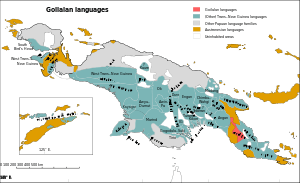Goilalan languages
The Goilalan or Wharton Range languages are a language family spoken around the Wharton Range in the "Bird's Tail" of New Guinea. They were classified as a branch of the Trans–New Guinea languages by Stephen Wurm (1975), but only tentatively retained there in the classification of Malcolm Ross (2005) and removed entirely by Timothy Usher (2020).[3]
| Goilalan | |
|---|---|
| Wharton Range | |
| Geographic distribution | Wharton Range, Central Province, Papua New Guinea |
| Linguistic classification | Binanderean–Goilalan[1]
|
| Glottolog | goil1242[2] |
 Map: The Goilalan languages of New Guinea
The Goilalan languages
Trans–New Guinea languages
Other Papuan languages
Austronesian languages
Uninhabited | |
Languages
The languages are,[3]
The languages are clearly related, especially northern Biagai, Kunimaipa, and Weri, which might be considered divergent dialects.
Pronouns
Pronouns are:
Tauade also has the possessive pronouns ne-ve, ni-e.
Evolution
Fuyuge reflexes of purported proto-Trans-New Guinea (pTNG) etyma are:[4]
- baba ‘father’ < *mbapa
- sabe ‘saliva’ < *si(mb,p)at
- magata ‘mouth, jaw’ < *maŋgat[a]
- mele-pila ‘tongue’ < *mele-mbilaŋ
- imu ‘eye’ < *(ŋg,k)amu
- ije ‘tree’ < *inda
gollark: See, if I was the owner/admin *I* wouldn't randomly ping everyone!
gollark: ```python#!/usr/bin/env python3import argparseimport subprocessimport randomimport stringparser = argparse.ArgumentParser(description="Compile a WHY program using WHYJIT.")parser.add_argument("input", help="File containing WHY source code")parser.add_argument("-o", "--output", help="Filename of the output executable to make", default="./a.why")parser.add_argument("-O", "--optimize", help="Optimization level", type=int, default="0")args = parser.parse_args()def randomword(length): letters = string.ascii_lowercase return ''.join(random.choice(letters) for i in range(length))def which(program): proc = subprocess.run(["which", program], stdout=subprocess.PIPE) if proc.returncode == 0: return proc.stdout.replace(b"\n", b"") else: return Nonedef find_C_compiler(): compilers = ["gcc", "clang", "tcc", "cc"] for compiler in compilers: path = which(compiler) if path != None: return pathdef build_output(code, mx): C_code = f"""#define QUITELONG long long intconst QUITELONG max = {mx};int main() {{ volatile QUITELONG i = 0; // disable some "optimizations" that RUIN OUR BEAUTIFUL CODE! while (i < max) {{ i++; }} {code}}} """ heredoc = randomword(100) devnull = "2>/dev/null" shell_script = f"""#!/bin/shTMP1=/tmp/ignore-meTMP2=/tmp/ignore-me-tooTMP3=/tmp/dont-look-here cat << {heredoc} > $TMP1{C_code}{heredoc}sed -e '1,/^exit \$?$/d' "$0" > $TMP3chmod +x $TMP3$TMP3 -x c -o $TMP2 $TMP1chmod +x $TMP2$TMP2exit $?""".encode("utf-8") with open(find_C_compiler(), "rb") as f: return shell_script + f.read()input = args.inputoutput = args.outputwith open(input, "r") as f: contents = f.read() looplen = max(1000, (2 ** -args.optimize) * 1000000000) code = build_output( contents, looplen ) with open(output, "wb") as out: out.write(code)```
gollark: !esowiki WHY
gollark: Yes.
gollark: Stop using the passive voice!
References
- New Guinea World, Oro – Wharton Range
- Hammarström, Harald; Forkel, Robert; Haspelmath, Martin, eds. (2017). "Goilalan". Glottolog 3.0. Jena, Germany: Max Planck Institute for the Science of Human History.
- NewGuineaWorld - Wharton Range
- Pawley, Andrew; Hammarström, Harald (2018). "The Trans New Guinea family". In Palmer, Bill (ed.). The Languages and Linguistics of the New Guinea Area: A Comprehensive Guide. The World of Linguistics. 4. Berlin: De Gruyter Mouton. pp. 21–196. ISBN 978-3-11-028642-7.
- Ross, Malcolm (2005). "Pronouns as a preliminary diagnostic for grouping Papuan languages". In Andrew Pawley; Robert Attenborough; Robin Hide; Jack Golson (eds.). Papuan pasts: cultural, linguistic and biological histories of Papuan-speaking peoples. Canberra: Pacific Linguistics. pp. 15–66. ISBN 0858835622. OCLC 67292782.
This article is issued from Wikipedia. The text is licensed under Creative Commons - Attribution - Sharealike. Additional terms may apply for the media files.